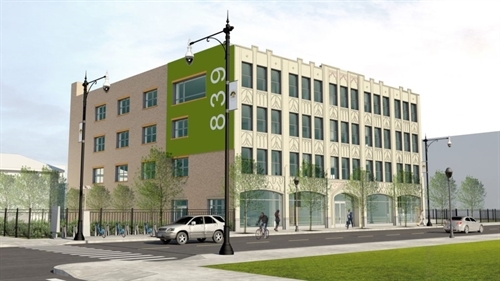U of I Board of Trustees approves Mile Square lease
Reprinted from University of Illinois System News
Published: January 22, 2021

The University of Illinois Board of Trustees approved a lease on Thursday for a new Mile Square health clinic in Auburn Gresham that will bring vital healthcare access to the underserved community on Chicago’s far south side.
The UI Health Mile Square Health Center will be the sole healthcare provider in the newly renovated Auburn Gresham Healthy Lifestyle Hub located at 79th Street and Halsted Avenue in Chicago. Mile Square will have more than 11,700 square feet of space in the building, including 12 patient rooms, six dental suites, a procedure room and an on-site phlebotomy lab.
“This is a significant new venture and I congratulate our team at the University of Illinois Chicago and Mile Square,” U of I System President Tim Killeen said. “This is right in line with our land-grant mission to serve society and its most needy, particularly in these difficult times. It is very important for the university to step up this way.”
Mile Square, a network of federally qualified healthcare centers across Chicago and Rockford, projects the new clinic, to be opened in the spring of 2022, will treat 11,000 patients annually and have as many as 21,000 visits per year, with a focus on immediate care and community-based safety. The clinic will also provide behavior health and mental health services.
Auburn Gresham and its adjacent communities have been designated a Primary Care Health Professional Shortage Area by the Health Resources and Services Administration.
“The Mile Square Health Center is thrilled to have the opportunity to establish another UI Health center under the Mile Square banner to address the healthcare burden affecting this community,” said Henry Taylor, president and chief executive officer of Mile Square. “The Auburn Gresham community is made up of 46,000 residents and is considered a medically underserved healthcare service desert. The population carries elevated burdens of opioid deaths, increased cardiovascular deaths, increased cancer mortality and increased firearm related homicides.”
The proposed lease is for approximately 1,038 square feet of space on the first floor and 10,711 rentable square feet of space on the second floor of the remodeled building, totaling 11,749 square feet of space. The term of the proposed lease is 10 years, commencing on or around December 2021.
The new center is part of the Greater Auburn Gresham Development Corporation’s (GAGDC) “Always Growing, Auburn Gresham” project. Last August, the project was awarded the first Chicago Prize, a $10 million grant competition sponsored by the Pritzker Traubert Foundation to invest in collaborative community-based initiatives that stimulate economic activity, strengthen civic infrastructure, and improve the safety, well-being, and economic mobility of residents on the city’s south and/or west sides. In addition, the city of Chicago committed $4 million in federal CARES Act funding to the Healthy Lifestyle Hub in July, as part of the city’s “Invest South/West” initiative.
The project involves the redevelopment of a 1920s-era, 50,000-square-foot building located at 839-845 West 79th St. that had been vacant for decades and is being converted into the Healthy Lifestyle Hub to serve the residents of the Auburn Gresham community.
“Mile Square is committed to community partnerships that enhance our ability to be responsive to the communities we serve. We are thankful for the partnership with Carlos Nelson and the Greater Auburn Gresham Development Corporation, who have been strong advocates of health equity for the AG community,” said Dr. Karriem Watson, associate executive director of Mile Square. “We are pleased to be able to leverage the expertise of our behavioral health team to develop a trauma-informed care model of behavioral health integrated within a primary care setting, including dental and social support for maternal and child health through our partnership with the Office of Community Engagement and Neighborhood Health Partners.”
Mile Square Health Center opened its first neighborhood clinic in 1967, and now has seven facilities that offer accessible and affordable healthcare services to Chicagoans. Its health clinics are located in neighborhoods across Chicagoland and provide care for nearly 40,000 people a year.